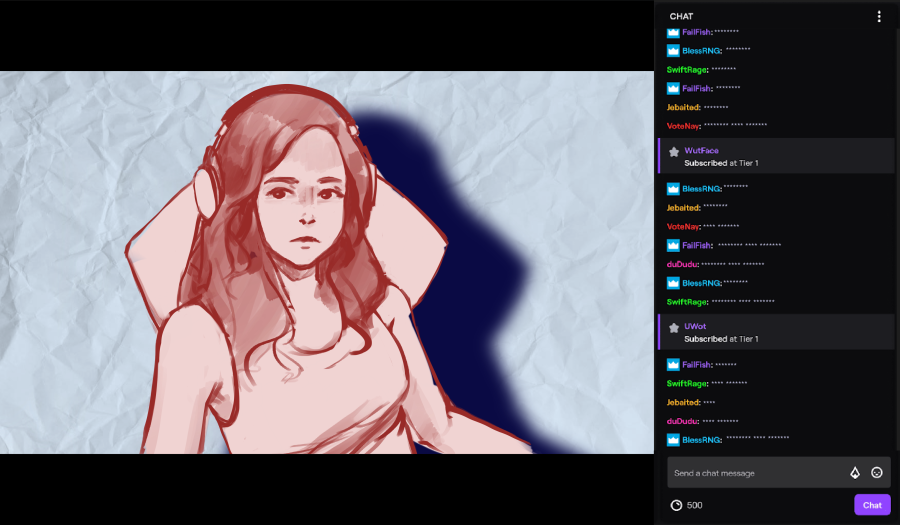The start of the pandemic sparked my return to the gaming community. With nothing to do all day but play, I had ended my half-year break from the infamous toxicity of gaming culture. At first, deciding to play the newly released Valorant was exciting as I had never played a first-person shooter (FPS) before, but then I remembered why I never wanted to in the first place.
Using voice chat in an FPS game is a very common and normal experience, but with the perception of one’s voice, comes the online, anonymous judgment. I had encountered toxic teammates before, usually criticizing my admittedly horrible gameplay, but in this specific instance, a random player decided to speak on more than just skill. The online stranger, who spoke unnecessarily rudely and arrogantly to the entire team, decided to pick on me after I had used voice chat to tell him to calm down, “I’m not homophobic, but you sound gay.”
I, of course, replied, “Maybe it’s because I am.” From that point on, he decided to call me essentially every slur he could think of and insult me based on this unrelated characteristic of mine. Even though I still ended with a better score than him, his malicious intent made the toxicity of the gaming community become much more apparent to me. And my experiences aren’t unique.
The gaming community containing toxic, problematic, and ignorant players is not a new issue. While, admittedly, “trash-talk” is a part of the gaming experience, there is a fine line between occasional banter and literal harassment. Criticizing someone based on their ability to play a game is one thing, but using sexism or homophobia to draw conclusions about one’s ability is a whole other. There needs to be changes made in gaming culture, by both individuals and companies, in order to make the community a safer, less toxic place.
There’s obviously no way that trash-talk and toxic remarks are ever going to leave the gaming community, as it is part of the competitive experience. However, there is no place for literal bullying and bigotry.
A study found that while 65% of all gamers have experienced “severe harassment” while playing online, of the LGBTQ+ gamers surveyed, 73% experienced harassment based on their sexual orientation. The toxicity of the online gaming community when it comes to the LGBTQ+ community is what causes 41% of queer gamers to avoid certain games due to fear of harassment and for 35% to lie about their sexual identity while online.
According to another survey conducted in May 2021, 77% of women responded dealing with at least some sort of frustration when gaming because of their gender, and 44% of female gamers received unsolicited inquiries about their relationship statuses while gaming. This presence of sexism and double standards in online games is why 59% of women hide their gender when playing online games to avoid harassment by their teammates.
Online harassment of these groups doesn’t just stop after a game has ended; instead, these forms of bullying have transitioned into the community of Twitch streamers and their viewers. Streamer Imane “Pokimane” Anys has repeatedly been told that her ability to play video games is hindered by the fact that she is female and that her following was only earned because of her appearance. Cody Garrett, also known as “Donut Operator,” was recently banned on Twitch for trying to reclaim the f-slur as a “gamer word,” despite not even being in the queer community.
Whenever someone tries to discuss these issues within the gaming community, oftentimes, they are met with ignorance and crudeness. Co-CEO of esports team Team Liquid Steven Arhancet tried to bring to attention the bigoted comments made during online games. On April 30, 2019, he tweeted: “Enough of all the homophobic slurs in pub games. No, just because you didn’t mean it that way doesn’t make it okay. Wake the fuck up.” It was no surprise when he was immediately met with even more bigoted responses. Replies such as “Oh no The libtards got to you” and “Stfu fag” highlight how normalized and deeply rooted these behaviors are for gamers.
The gaming community needs to create better solutions to combat the toxic groups that enable sexist, homophobic, and transphobic harassment instead of normalizing these interactions. It is because of these accepted behaviors that Streamer “Sweet Anita” found a subreddit fully dedicated to sexualizing her, and Black nonbinary Streamer Raven “RekItRaven” was hate-raided with racist, sexist, antisemitic, and homophobic comments during one of their streams.
Not using voice chat to communicate with your team due to the fear of being bullied because of your gender, sexuality, or even the way your voice sounds shouldn’t even be an issue. The online gaming community is inflated by bigoted, ignorant men who have no regard for respecting the mental well-being of others.
Of course, there is no fool-proof way to rid games of online trolls who are intentionally offensive and rude, but there is a way to forcefully punish those who continue to cross the line between competitive banter and ignorant bullying. While most gaming companies and streaming platforms have features where you can report users who ignore community guidelines and spout hateful comments, more needs to be done by gaming companies to regulate the toxic culture that most online games have come to have.
While Riot Games, which created Valorant and League of Legends, has a detailed Code of Conduct that entails the consequences of not following the community guidelines such as chat restrictions, suspension from ranked games, and permanent bans, games like Counter-Strike: Global Offensive, which is infamously known for their toxic community, have a vague policy regarding their punishments for harassment and toxicity.
There needs to be harsher bans and punishment for sexism, homophobia, transphobia, and other ignorant comments made by users across all games and streaming platforms. If gaming companies truly care about the well-being of their players and consumers, they need to tighten up and fully flesh out their community guidelines and try to put an end to the overly toxic community instead of turning a blind eye in fear of decreasing their player count. Moreso, these companies need to publicly address the toxicity and bigotry within their respective communities, making it clear where they stand and what behaviors will be tolerated in their games.
But most importantly, as individuals, don’t be afraid to call people out during your games. I’ve seen too many people be complicit in the overtly toxic and bigoted comments being made during games.
Amanda Cote, a professor of Media Studies/Game Studies at the University of Oregon, found that “the right cultural norms can result in healthy online communities, even in the highly competitive world of esports.” Becoming desensitized to the ignorance and bigotry perpetuated by the gaming community helps no one and allows the online trolls to run rampant and think that their behaviors are acceptable online.
Tolerating this behavior makes you complicit. Stand up for and support those who don’t have the privilege to ignore these issues. Gaming is supposed to be a fun experience, not something full of hateful, hurtful, and problematic interactions.
Thankfully, I have tough skin and didn’t let this online troll affect my overall gaming experience. Still, this is an issue that minority groups should not have to face online. So, please, if you are part of the problem, do all of us a favor and just grow up.
Art by Nicholas Regli for the UCSD Guardian.

















Alice • Apr 3, 2022 at 2:44 pm
If you like playing games, you should check out the amazing Drakemall mystery box , which provide a chance to open a case and get actual prizes. I received CS:GO-related things from Drakemall.com as a present and was quite appreciative of them.
alam • Mar 12, 2022 at 5:30 pm
It is a predominantly male space. Males make fun of each other. I cannot comprehend how you can step into a male space and expect to be treated differently than how men treat each other. Anyway, the mute button is very useful. Use it.
“So, please, if you are part of the problem, do all of us a favor and just grow up. ”
The one who is devasted by mere words is the one who needs growing up.
Jake Ryan Raigoza • Mar 8, 2022 at 8:26 am
its possibible the “cause” is nothing more that a vapiid(pronounced vipid) excuuuse.. i too am feed up biut dont hand responcibility in the last paragragh to the user and uinstead search like a explorer… for the ownership..
i am not fort of the problem but uyet.. as.. i type there fragile words. it can become all to clear that the problem is dying. as the Jehovah god says ,”there is love peace joy and harmoney, love ner get puffed up… yet after ALL these things.. LOVE..NEVER..FAILS
JAKE OUT!!!!!!!!!!!!